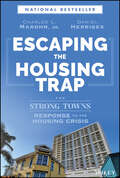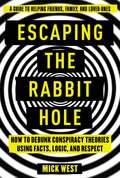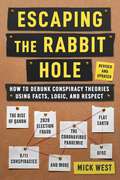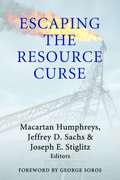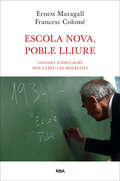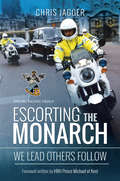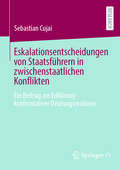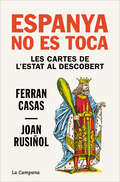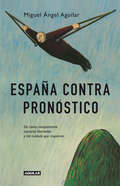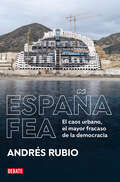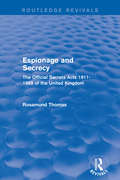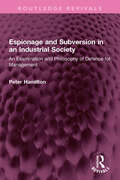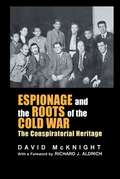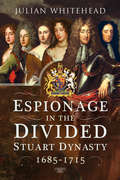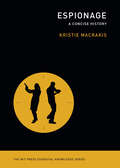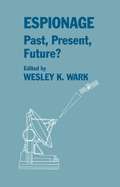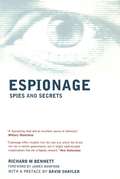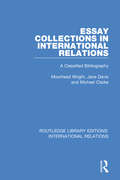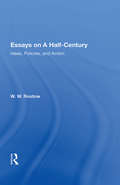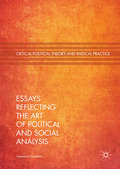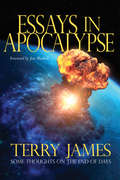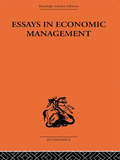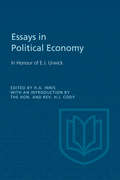- Table View
- List View
Escaping the Housing Trap: The Strong Towns Response to the Housing Crisis
by Charles L. Marohn Jr. Daniel HerrigesHousing is an investment. Investment prices must go up. Housing is shelter. When the price of shelter goes up, people experience distress.This is the housing trap. It’s time to escape. In Escaping the Housing Trap: The Strong Towns Solution to the Housing Crisis, renowned urbanists Charles (Chuck) Marohn and Daniel Herriges introduce a first-of-its-kind discussion of the tension between housing as a financial product and housing as shelter. This is the key insight that’s been missing from the Housing Crisis Conversation; and the insight that can help cities fight back against the crisis from the bottom-up.This book offers a serious, yet accessible, history of housing policy in the United States and explains how it led us to this point in time: where we face a market that is rigged against people who, only a few decades ago, could have been homeowners or stable, long-term rentals. Only local change, on a neighborhood or city-wide scale, can begin to restore balance to the housing market. Escaping the Housing Trap is the must-read resource for everyone with a stake in the future of housing in America—and that means everyone. Readers will find: Discussions of housing as an investment and how the country's neighborhoods are being transformed by the introduction of large amounts of investment Explorations of housing as shelter, including discussions of zoning policy and NIMBYism A comprehensive overview of the Strong Towns approach to solving the American housing crisis
Escaping the Rabbit Hole: How to Debunk Conspiracy Theories Using Facts, Logic, and Respect
by West MickThe Earth is flat, the World Trade Center collapse was a controlled demolition, planes are spraying poison to control the weather, and actors faked the Sandy Hook massacre…. All these claims are bunk: falsehoods, mistakes, and in some cases, outright lies. But many people passionately believe one or more of these conspiracy theories. They consume countless books and videos, join like-minded online communities, try to convert those around them, and even, on occasion, alienate their own friends and family. Why is this, and how can you help people, especially those closest to you, break free from the downward spiral of conspiracy thinking? In Escaping the Rabbit Hole, author Mick West shares over a decade’s worth of knowledge and experience investigating and debunking false conspiracy theories through his forum, MetaBunk.org, and sets forth a practical guide to helping friends and loved ones recognize these theories for what they really are. Perhaps counter-intuitively, the most successful approaches to helping individuals escape a rabbit hole aren’t comprised of simply explaining why they are wrong; rather, West’s tried-and-tested approach emphasizes clear communication based on mutual respect, honesty, openness, and patience. West puts his debunking techniques and best practices to the test with four of the most popular false conspiracy theories today (Chemtrails, 9/11 Controlled Demolition, False Flags, and Flat Earth) — providing road maps to help you to understand your friend and help them escape the rabbit hole. These are accompanied by real-life case studies of individuals who, with help, were able to break free from conspiracism. With sections on:the wide spectrum of conspiracy theories avoiding the “shill” label psychological factors and other complications(and concluding with) a look at the future of debunking, Mick West has put forth a conclusive, well-researched, practical reference on why people fall down the conspiracy theory rabbit hole and how you can help them escape.
Escaping the Rabbit Hole: How to Debunk Conspiracy Theories Using Facts, Logic, and Respect (Revised and Updated - Includes Information about 2020 Election Fraud, The Coronavirus Pandemic, The Rise of QAnon, and UFOs)
by Mick WestRevised and updated for the first time in 2023—Now includes strategies for debunking conspiracies regarding the coronavirus pandemic, election fraud, QAnon, UFOs, and more. The Earth is flat, the World Trade Center collapse was a controlled demolition, planes are spraying poison to control the weather, and actors faked the Sandy Hook massacre. All these claims are bunk: falsehoods, mistakes, and in some cases, outright lies. But many people passionately believe one or more of these conspiracy theories. They consume countless books and videos, join like-minded online communities, try to convert those around them, and even, on occasion, alienate their own friends and family. Why is this, and how can you help people, especially those closest to you, break free from the downward spiral of conspiracy thinking? In Escaping the Rabbit Hole, author Mick West shares over a decade&’s worth of knowledge and experience investigating and debunking false conspiracy theories through his forum, MetaBunk.org, and sets forth a practical guide to helping friends and loved ones recognize these theories for what they really are. Perhaps counter-intuitively, the most successful approaches to helping individuals escape a rabbit hole aren&’t comprised of simply explaining why they are wrong; rather, West&’s tried-and-tested approach emphasizes clear communication based on mutual respect, honesty, openness, and patience. West puts his debunking techniques and best practices to the test with the most popular false conspiracy theories today (Chemtrails, The Coronavirus Pandemic, 9/11 Controlled Demolition, Election Fraud, False Flags, Flat Earth, The Rising of QAnon, and UFOs)—providing road maps to help you to understand your friend and help them escape the rabbit hole. These are accompanied by real-life case studies of individuals who, with help, were able to break free from conspiracism. With sections on: the wide spectrum of conspiracy theoriesavoiding the &“shill&” labelpsychological factors and other complications(and concluding with) a look at the future of debunking Mick West has put forth a conclusive, well-researched, practical reference on why people fall down the conspiracy theory rabbit hole and how you can help them escape.
Escaping the Resource Curse
by Jeffrey D. Sachs Joseph E. Stiglitz Macartan HumphreysThe wealth derived from natural resources can have a tremendous impact on the economics and politics of producing countries. In the last quarter century, we have seen the surprising and sobering consequences of this wealth, producing what is now known as the "resource curse." Countries with large endowments of natural resources, such as oil and gas, often do worse than their poorer neighbors. Their resource wealth frequently leads to lower growth rates, greater volatility, more corruption, and, in extreme cases, devastating civil wars. In this volume, leading economists, lawyers, and political scientists address the fundamental channels generated by this wealth and examine the major decisions a country must make when faced with an abundance of a natural resource. They identify such problems as asymmetric bargaining power, limited access to information, the failure to engage in long-term planning, weak institutional structures, and missing mechanisms of accountability. They also provide a series of solutions, including recommendations for contracting with oil companies and allocating revenue; guidelines for negotiators; models for optimal auctions; and strategies to strengthen state-society linkages and public accountability. The contributors show that solutions to the resource curse do exist; yet, institutional innovations are necessary to align the incentives of key domestic and international actors, and this requires fundamental political changes and much greater levels of transparency than currently exist. It is becoming increasingly clear that past policies have not provided the benefits they promised. Escaping the Resource Curse lays out a path for radically improving the management of the world's natural resources.
Escaping the Resource Curse (Initiative for Policy Dialogue at Columbia: Challenges in Development and Globalization)
by Jeffrey D. Sachs Joseph E. Stiglitz Eds. Humphreys MacartanThe wealth derived from natural resources can have a tremendous impact on the economics and politics of producing countries. In the last quarter century, we have seen the surprising and sobering consequences of this wealth, producing what is now known as the "resource curse." Countries with large endowments of natural resources, such as oil and gas, often do worse than their poorer neighbors. Their resource wealth frequently leads to lower growth rates, greater volatility, more corruption, and, in extreme cases, devastating civil wars. In this volume, leading economists, lawyers, and political scientists address the fundamental channels generated by this wealth and examine the major decisions a country must make when faced with an abundance of a natural resource. They identify such problems as asymmetric bargaining power, limited access to information, the failure to engage in long-term planning, weak institutional structures, and missing mechanisms of accountability. They also provide a series of solutions, including recommendations for contracting with oil companies and allocating revenue; guidelines for negotiators; models for optimal auctions; and strategies to strengthen state-society linkages and public accountability. The contributors show that solutions to the resource curse do exist; yet, institutional innovations are necessary to align the incentives of key domestic and international actors, and this requires fundamental political changes and much greater levels of transparency than currently exist. It is becoming increasingly clear that past policies have not provided the benefits they promised. Escaping the Resource Curse lays out a path for radically improving the management of the world's natural resources.
Escola nova, poble lliure: 1492 dies a educació, disculpeu les molèsties
by Ernest MaragallUn relat senzill, una reflexió personal i una anàlisi breu però suficient del què i el perquè sobre tot allò que es va imaginar, projectar i dur a terme en els quatre anys del mandat transcorregut entre desembre del 2006 i desembre del 2010 al Departament d'Educació del Govern de la Generalitat de Catalunya. A cavall de les memòries, el llibre polític i l’assaig sobre educació, Ernest Maragall, conseller d’Educació en el segon tripartit i el que va ser el seu Secretari de Polítiques Educatives al departament, Francesc Colomer, fan un recorregut pels reptes principals que van haver d’assumir, les reformes que van emprendre, les reticències o les aliances que van trobar. En resulta un llibre que, memòria i anècdota a banda, de fons planteja què es pot fer per millorar la qualitat educativa del nostre sistema; si hi ha un espai i un marge d'actuació des de la responsabilitat política, i si és possible plantejar canvis d'una certa profunditat i exercicis d'autoresponsabilitat als propis actors del sistema.
Escorting the Monarch
by Chris JaggerEscorting the Monarch is as close to an official history of the Metropolitan Police's 'Special Escort Group' (SEG) as one could hope for.You may have seen the team at work; as the combination of motorcycles and cars pass you by, they glide elegantly and seemingly effortlessly through busy traffic. Developing a dedicated and diligent team culture, they are masters of their trade. They hold a well-earned reputation for excellence amongst their peers; delivering their passengers (and cargo) on time, safely, in a great deal of style, and without fuss or mishap. Professional and precise in the execution of their operations, they are neither shaken nor stirred.Although the work of the SEG demands exquisitely high levels of presentation there is little room for gloss or glitter. The individuals and property they are charged to protect are assessed by government to need the highest possible levels of protection. From queens, kings, presidents and emperors, to priceless works of art, terrorists and high risk prisoners, the group escort them all.Written by the son of a retired SEG officer who himself served in the British Government's security and intelligence community, Escorting the Monarch is told, in part, through first hand stories and anecdotes gleaned from former officers of the group. The insights offered are unique, privileged and first of their kind. Chris Jagger unfolds a collection of fascinating and never before told stories built on high profile events, such as the funeral of Sir Winston Churchill, and the visit of Nelson Mandela.Now the SEG have honed their skills for over 6 decades. Through a carefully constructed description of a changing security and political environment across the decades, and an insightful analysis of the ingenuity of those who have severed with the SEG, _Escorting the Monarch_ explains the events that made the group who they are today.
Eskalationsentscheidungen von Staatsführern in zwischenstaatlichen Konflikten: Ein Beitrag zur Erklärung konfrontativer Deutungsroutinen
by Sebastian CujaiNach dem russischen Angriff auf die Ukraine im Februar 2022 bewegt viele Menschen die Frage, was den russischen Staatsführer zu dieser Entscheidung bewogen hat. Während sich die Forschung schon länger mit dieser Thematik befasst, werden dabei oft der Staatsführer und seine Persönlichkeit unzureichend berücksichtigt. Vor diesem Hintergrund betrachtet Sebastian Cujai die grundlegende Fragestellung, warum sich Staatsführer für die Eskalation eines zwischenstaatlichen Konfliktes entscheiden. Um den Entscheidungsprozess zu verstehen, ist die Deutung der zwischenstaatlichen Beziehungen durch den Staatsführer ein vernachlässigter, aber zentraler Faktor. Der Autor adressiert diese Lücke durch die induktive Generierung einer allgemeinen, fallübergreifenden Erklärung von konfrontativen Deutungsroutinen. Dazu analysiert er sieben repräsentative Eskalationsentscheidungen und berücksichtigt dabei sowohl das situative Umfeld als auch die Persönlichkeit der Staatsführer. Basierend auf den Analyseergebnissen entwickelt der Autor einen theoretischen Ansatz, welcher die zentralen Deutungsschritte der Staatsführer im Vorfeld einer Eskalationsentscheidung erklärt. Daraus ergeben sich mehrere hypothetische Deutungsroutinen, die zu einem umfassenden Verständnis des Entscheidungsprozesses eines Staatsführers im Vorfeld einer zwischenstaatlichen Konflikteskalation beitragen.
Espanya no es toca: Les cartes de l'Estat al descobert
by Ferran Casas Joan RusiñolUna exhaustiva i rigorosa investigació periodística que posa les cartes de l'Estat sobre la taula. Una lectura imprescindible per saber qui ha decidit que Espanya no es toca. La Constitució del 1978 sorgida de la Transició va assentar els pilars d'un règim que sembla inamovible. Ni l'independentisme ni la irrupció de partits com Podem n'han fet trontollar els fonaments sinó que, fins i tot, han estat l'excusa per alimentar la reacció. Per què?El bipartidisme, el poder judicial i els grans grups de comunicació, entre d'altres, són els guardians d'una torre que, quan la veuen amenaçada, també defensen des de les clavegueres. Al capdamunt de tot hi ha una monarquia que, malgrat els escàndols, sembla intocable. A partir de les fonts i de l'anàlisi política dels fets més rellevants dels últims anys, Ferran Casas i Joan Rusiñol fan una radiografia descarnada dels poders fàctics de l'Estat. I en parlen amb alguns dels seus protagonistes: José Luis Rodríguez Zapatero, Esperanza Aguirre, Juan Luis Cebrián, Gonzalo Boye, entre d'altres.
España contra pronóstico: De cómo conquistamos nuestras libertades y del cuidado que requieren
by Aguilar, Miguel ÁngelUn libro lleno de verdad que repasa cada una de las señas de identidad de España, la economía y la clase política. Necesario y de actualidad. «Las reflexiones aquí recogidas parten de la fragilidad de la democracia. Sostienen la reversibilidad de sus logros. Salen al paso del entusiasmo que entre nosotros provocan los desastres. Alertan contra el regreso al cainismo de las dos Españas. Se dirigen a esa tercera España, la de los transterrados. Pero acusan, sin duda, su procedencia; la de un periodista con deberes de urgencia. Cumplen con el deber de molestar. Consideran que preguntar no ofende. Distinguen entre el principio de causalidad y el de contigüidad. Permiten deducir el coste de la no España».MIGUEL ÁNGEL AGUILAR El periodista Miguel Ángel Aguilar, colaborador habitual en diversos medios nacionales, examina con la lucidez que no empaña la pasión las instituciones de hoja perenne de la sociedad española desde elfinal del franquismo, los logros de la democracia y la situación actual. Y repasa con estilo periodístico irónico y certero la actualidad que tergiversa la realidad, la Constitución, la monarquía, las Fuerzas Armadas, la Iglesia, los partidos políticos, la respuesta de los ciudadanos en la calle, la justicia, el estado del bienestar o Europa, entre otras cuestiones fundamentales. España contra pronóstico es un libro lleno de verdad, irónico, necesario, que incentiva la reflexión sobre algunas de las señas de identidad de nuestro país y sirve al autor de exorcismo liberador.
España fea: El caos urbano, el mayor fracaso de la democracia
by Andrés RubioEl relato del mayor fracaso de la democracia: el caos urbano y paisajístico. ¿Por qué la Constitución de 1978 no incluye la palabra «paisaje»? ¿Por qué no existe en España un Conservatorio del Litoral como el francés? ¿Por qué en 1967 había catalogados más de mil pueblos bonitos en España y ahora no quedan ni cien? ¿Por qué la democracia y su régimen de Comunidades Autónomas han sido gravemente dañinos para el paisaje y, en consecuencia, han arruinado de manera irreparable el imaginario colectivo? España fea es un estudio brillante de las barbaridades cometidas sobre el patrimonio español desde el final de la dictadura de Franco hasta la actualidad. Desgrana con rigor y sensibilidad los disparates llevados a cabo de las costas mediterráneas a las del norte, pasando por la «España vaciada» y el desastre urbanístico de Madrid, y analiza las causas que nos han conducido a esta catástrofe cultural sin precedentes. Revela la estrategia urdida por políticos y promotores ignorantes y corruptos, con el silencio cómplice de un gremio desmovilizado, el de la arquitectura, más la indiferencia y desconocimiento del mundo intelectual y los medios de comunicación. Pese a todo, el libro también analiza con detalle algunos ejemplos de trabajo bien hecho, enlazando con la mejor tradición europea, en ciudades como Barcelona o Santiago de Compostela, o en pueblos como Albarracín o Vejer de la Frontera. Partiendo de numerosas entrevistas, y uniendo la crónica periodística, el libro de viajes y el ensayo político, Andrés Rubio presenta un texto de gran originalidad y lleno de matices. Analizando además los casos de Francia, Alemania e Italia, traslada un mensaje europeísta y progresista de defensa de las mejores cualidades de lo público, propugnando la ordenación del territorio como arma indispensable para afirmar la democracia.
Espionage and Secrecy: The Official Secrets Acts 1911-1989 of the United Kingdom (Routledge Revivals)
by Rosamund ThomasThis prize-winning book, first published in 1991, provides a detailed legal account of the development of the UK Official Secrets Acts 1911-1989. In particular, the Espionage section (s.1) of this criminal law is analysed carefully, illustrated by leading cases of UK spies prosecuted under this section, particularly during the 1980’s — including MI5 officer Michael Bettaney and Geoffrey Prime who worked at GCHQ. The author also examines problems of evidence in espionage prosecutions, and the consent of the Attorney-General in cases under the Official Secrets Acts. This book remains the definitive treatise on the UK Official Secrets Acts, especially concerning the espionage provisions.
Espionage and Subversion in an Industrial Society: An Examination and Philosophy of Defence for Management (Routledge Revivals)
by Peter HamiltonFirst Published in 1967, Espionage and Subversion in an Industrial Society presents a comprehensive overview of the true significance of industrial espionage and its relationship with the struggle for economic supremacy of a nation. Industrial espionage is a growth industry and the new battlefield where nations and ideologies struggle for economic supremacy. This and subversive activity may seem relatively harmless in comparison with a ‘hot war’. It is however precisely because the temperature of an all-out war would destroy the civilization, we know that industrial espionage and subversion assume importance. In this book Mr Hamilton has combined his own extensive security knowledge with thorough research in his subjects. This is an interesting read for scholars of diplomacy, international economics, and international politics.
Espionage and the Roots of the Cold War: The Conspiratorial Heritage (Studies in Intelligence)
by David McKnightFrom the 1930s to the 1950s a large number of left-wing men and women in the USA, Britain, Europe, Australia and Canada were recruited to the Soviet intelligence services. They were amateurs and the reason for their success is intriguing. Using Soviet archives, this work explores these successes.
Espionage in the Divided Stuart Dynasty, 1685–1715: 1685-1715
by Julian WhiteheadA historian and intelligence expert explores intrigue, betrayal, and spying in Stuart England after the Glorious Revolution of 1688.King James II was the Catholic king of a Protestant nation. Though he had inherited a secure crown, he would soon find himself isolated and flee to France in exile. His throne was seized by his Protestant son-in-law William and daughter Mary. For James it was a personal tragedy of King Lear proportions; for most of his subjects it was a Glorious Revolution that saved his kingdoms from popery.Over the next hundred years James and his descendants would attempt to win back the crown with French support and conspiring with British Jacobites and Tories. In Espionage in the Divided Stuart Dynasty, Julian Whitehead charts the inner workings of government intelligence during this unstable period. His narrative sheds light on the murky world of spies and double agents at a time of when many politicians and peers tried to keep a foot in both camps.
Espionage: A Concise History (The MIT Press Essential Knowledge series)
by Kristie MacrakisA concise introduction to the history and methods of espionage, illustrated by spy stories from antiquity to today&’s high-tech world.Espionage is one of the most secret of human activities. It is also, as the popularity of spy stories suggests, one of the most intriguing. This book pulls the veil back on the real world of espionage, revealing how spying actually works. In a refreshingly clear, concise manner, Kristie Macrakis guides readers through the shadowy world of espionage, from the language and practice of spycraft to its role in international politics, its bureaucratic underpinnings, and its transformation in light of modern technology. Espionage is a mirror of society and human foibles with the added cloak of secrecy and deception. Accordingly, Espionage traces spying all the way back to antiquity, while also moving beyond traditional accounts of military and diplomatic intelligence to shine a light on industrial espionage and the new techno-spy. As thorough—and thoroughly readable—as it is compact, the book is an ideal introduction to the history and anatomy of espionage.
Espionage: Past, Present and Future? (Studies in Intelligence)
by Wesley K. WarkHighlights of the volume include pioneering essays on the methodology of intelligence studies by Michael Fry and Miles Hochstein, and the future perils of the surveillance state by James Der Derian. Two leading authorities on the history of Soviet/Russian intelligence, Christopher Andrew and Oleg Gordievsky, contribute essays on the final days of the KGB. Also, the mythology surrounding the life of Second World War intelligence chief, Sir William Stephenson, The Man Called Intrepid', is penetrated in a persuasive revisionist account by Timothy Naftali. The collection is rounded off by a series of essays devoted to unearthing the history of the Canadian intelligence service.
Espionage: Spies and Secrets
by Richard BennettThe need to defend against terrorist outrages has drawn unprecedented public attention to modern-day global espionage, from the US government's involvement in the politics of the Middle East, Europe and Africa, to the surveillance of their own citizens by governments throughout the western world. This compelling reference resource contains over 500 entries covering every aspect of modern-day intelligence-gathering and counter-terrorism, along with a comprehensive overview of its history. Global in scope, Espionage focuses in particular on developments in the field of intelligence since the end of the Cold War:-Governmental failure to foresee recent terrorist attacks against western targets-Counter-Terrorism, including the growth in commercial terrorism-Electronic and communications surveillance-Illegal activities by the intelligence services from around the world, including assassination, smuggling and torture-Terminology and equipment explainedWith entries on individual spies, politicians and diplomats, from the players to the patsies, and profiles of the key historical events and scandals from the history of spying, Espionage is the ultimate guide for journalists, researchers and anyone with an interest in this highly topical, controversial and chilling subject.
Essay Collections in International Relations: A Classified Bibliography (Routledge Library Editions: International Relations #10)
by Jane Davis Michael Clarke Moorhead WrightThis bibliography, originally published in 1977, details original material on international relations since 1870 written in English and appearing in non-recurrent multi-author works published between 1945 and 1975. The authors have distinguished between core topics such as foreign policy, defence, and international organisation, and peripheral areas such as interntional economics, international law and diplomatic history. Essays have been selected which make an enduring and substantial contribution to the study of IR. .
Essays On A Half Century: Ideas, Policies, And Action
by W. W. RostowThis volume reflects an effort to bring ideas to bear on major issues of domestic and foreign policy. It is an interaction of the author's working in academic and working in the realm of public service.
Essays Reflecting the Art of Political and Social Analysis (Critical Political Theory and Radical Practice)
by Lawrence DavidsonIn 2011, Lawrence Davidson founded his website, tothepointanalyses.com, as a home for his brief essays on contemporary issues touching on US domestic and foreign policy. Over the last few years, Davidson's analytic reflections on contemporary politics have garnered over six million views. Now, for the first time, these essays are collected together to form a coherent, punchy look at American Politics in 2018. Contextualized by a new prologue and new conclusion, as well as updated with new material throughout, these essays provide a cogent demonstration of the power of analytical thinking to create clear and understandable descriptions of issues that impact us all, but are most often obfuscated by propaganda, lying by omission, or other forms of distortion. For those who encounter this work, it is hoped that they will come away with a clearer, if not happier, idea of what sort of world we are all living in.
Essays in Apocalypse: Some Thoughts on the End of Days
by Terry JamesA tense world struggles in chaos…and the clock is ticking. Events are aligning as mankind spirals into anger, war, fear, and hopelessness. Nations are at odds with populism and globalism. Political leaders and dictators vie for power and influence. Looking back, you wonder “how did we get here?” Yet, these events are only signposts to the real future of mankind…the prophetic end of days. Globalism and Israel remain the two important factors to understanding key biblical prophecies. Signals abound that this generation is on the edge of experiencing a transition into the Tribulation. There may be no more dramatic proof that this sudden change is about to happen than what has resulted from the election of Donald J. Trump as president of the United States. In addition to being staunchly anti-globalism, Trump is stridently pro-Israel; moving the American Embassy from Tel Aviv to Jerusalem is proof. Now discover: Why Israel is such an important target for Satan How America is part of the biblical prophecies Which country is Babylon the Great – and why it will be destroyed Follow prophecy expert Terry James as he shares a collection of pivotal essays from 2015 to 2017 that reveal and highlight the prophetic clues that have brought us to this point in the countdown to a coming judgment. It all comes down to a single question — are you prepared for what is to come?
Essays in Economic Management
by Alec CairncrossThe papers in this volume cover the following areas:* Government and Industry* The Managed Economy* Monetary Policy* Fiscal Policy* Economic Forecasting and Economic Planning* Economists in Government
Essays in Political Economy: In Honour of E.J. Urwick
by Harold Innis Cody H. J.This volume of essays in Political Science is a tribute to the character and work of Professor Edward Johns Urwick who in June, 1937, retired under the age limit from the chair of Political Economy in the University of Toronto. It is the first volume of a series in Political Economy to be published by the Maurice Cody Foundation and the University of Toronto Press. It includes articles written by colleagues of Professor Urwick in the Department of Political Economy on subjects in which they had special interest, and articles which are summaries of work done by holders of the Maurice Cody Fellowship since its establishment in 1928. By a happy coincidence, this volume is issued fifty years after the chair in Political Economy was founded.
Essays in the History of Canadian Law
by Donald Fyson G. Blaine BakerThe essays in this volume deal with the legal history of the Province of Quebec, Upper and Lower Canada, and the Province of Canada between the British conquest of 1759 and confederation of the British North America colonies in 1867. The backbone of the modern Canadian provinces of Ontario and Quebec, this geographic area was unified politically for more than half of the period under consideration. As such, four of the papers are set in the geographic cradle of modern Quebec, four treat nineteenth-century Ontario, and the remaining four deal with the St. Lawrence and Great Lakes watershed as a whole.The authors come from disciplines as diverse as history, socio-legal studies, women's studies, and law. The majority make substantial use of second-language sources in their essays, which shade into intellectual history, social and family history, regulatory history, and political history.
